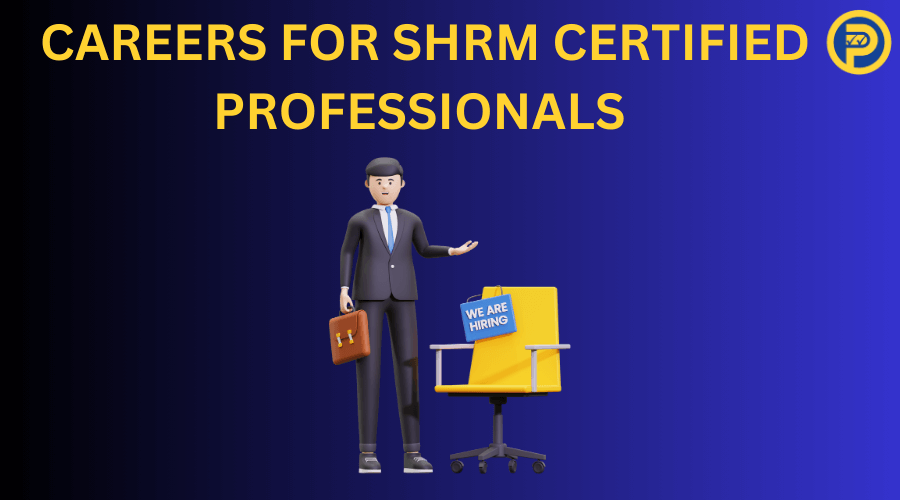The SHRM Certified Professional (SHRM-CP) credential is a significant asset for individuals pursuing or advancing their careers in human resources (HR).
As the global standard for HR professionals functioning at the operational level, this certification validates expertise in HR practices and principles, enhancing one’s ability to contribute effectively to organizational success.
With the evolving landscape of work and the increasing complexity of HR responsibilities, SHRM-CP certified professionals find themselves equipped with the knowledge and skills necessary to navigate various career paths within the field.
This article explores the diverse career opportunities available to SHRM-CP certified professionals, detailing roles across different sectors and highlighting essential skills and responsibilities associated with each position.
Learn: How to Register for SHRM
1. Human Resources Generalist
Human Resources Generalists play a crucial role in managing various HR functions within an organization. They are responsible for:
Recruitment and Staffing
Generalists handle the recruitment process, from job postings to interviewing candidates and onboarding new hires. They often collaborate with hiring managers to understand staffing needs and develop job descriptions that attract suitable candidates.
Find out: 10 Reasons as to Why Companies Post Jobs if they Hire Internally
Employee Relations
They address employee concerns, mediate conflicts, and foster a positive workplace culture. This role involves actively listening to employees’ grievances and facilitating open communication between staff and management.
Compliance
Ensuring that the organization adheres to labor laws and regulations such as the Occupational Safety and Health Act (OSHA) is a key responsibility, including maintaining employee records and handling workplace investigations.
Generalists must stay informed about changes in employment legislation to mitigate legal risks.
2. Employee Relations Specialist
Employee Relations Specialists focus on maintaining a healthy work environment by fostering positive relationships between employees and management. Their duties include:
- Conflict Resolution: They mediate disputes and provide guidance on conflict management strategies. This often involves conducting investigations into complaints and recommending appropriate actions.
- Policy Development: Specialists help develop and implement HR policies that promote fairness and equity within the workplace. They ensure that policies are communicated effectively to all employees.
- Training Programs: They often conduct training sessions on topics like diversity, inclusion, and workplace behavior. By equipping employees with conflict resolution skills, they contribute to a more harmonious workplace.
3. Talent Acquisition Specialist
Talent Acquisition Specialists are dedicated to sourcing, attracting, and hiring top talent for organizations. Their responsibilities encompass:
- Strategic Sourcing: Utilizing various platforms such as ZipRecruiter to identify potential candidates, including social media and job boards. They leverage technology such as applicant tracking systems (ATS) to streamline the recruitment process.
- Interviewing: Conducting interviews to assess candidates’ qualifications and cultural fit within the organization. This role requires strong interviewing skills to evaluate both technical competencies and soft skills.
- Employer Branding: Promoting the organization as an employer of choice through marketing initiatives and outreach programs. Specialists often collaborate with marketing teams to enhance the company’s image in the job market.
Read: How Long Should I Study for the SHRM-CP Exam
4. Compensation and Benefits Analyst
Compensation and Benefits Analysts focus on developing competitive compensation structures and benefits packages to attract and retain talent. Key tasks include:
- Market Analysis: Conducting salary surveys to ensure competitive pay rates within the industry. Analysts must analyze data from various sources to benchmark salaries effectively.
- Benefits Administration: Managing employee benefits programs, including health insurance, retirement plans, and wellness initiatives. They also communicate benefits information clearly to employees during enrollment periods.
- Compliance Monitoring: Ensuring that compensation practices comply with legal requirements. Analysts stay updated on changes in regulations affecting compensation structures.
Related post: SHRM Certified Professional Salary
5. Training and Development Manager
Training and Development Managers are responsible for enhancing employee skills through effective training programs. Their roles typically involve:
- Needs Assessment: Identifying training needs through performance evaluations and employee feedback. They work closely with department heads to pinpoint skill gaps that need addressing.
- Program Development: Designing training modules that align with organizational goals. Managers often utilize various instructional methods, including e-learning platforms, workshops, or on-the-job training.
- Evaluation: Assessing the effectiveness of training programs through metrics such as employee performance improvements or feedback surveys post-training sessions.

6. HR Manager
HR Managers oversee all aspects of human resources within an organization, ensuring alignment with business objectives. Their responsibilities include:
- Strategic Planning: Collaborating with senior leadership to develop HR strategies that support organizational goals. They analyze workforce trends to anticipate future staffing needs.
- Policy Implementation: Ensuring that HR policies are effectively communicated and implemented across departments. Managers often conduct training sessions for staff on new policies or procedures.
- Team Leadership: Leading the HR team in executing initiatives related to recruitment, employee engagement, and compliance. Effective leadership is crucial for fostering a motivated HR team.
7. Organizational Development Consultant
Organizational Development Consultants focus on improving organizational effectiveness through strategic change initiatives. Their work involves:
- Change Management: Assisting organizations in navigating transitions such as mergers or restructuring. Consultants develop change management plans that minimize disruption during transitions.
- Culture Assessment: Evaluating organizational culture to identify areas for improvement. This may involve conducting surveys or interviews with employees at all levels.
- Leadership Development: Designing programs aimed at enhancing leadership capabilities across the organization by providing coaching or mentoring opportunities for emerging leaders.
Check out: SHRM-CP Certification Cost
8. Diversity and Inclusion Officer
Diversity and Inclusion Officers are dedicated to promoting diversity within the workplace while fostering an inclusive culture. Their roles typically include:
- Program Development: Creating initiatives aimed at increasing diversity in hiring practices by collaborating with external organizations or community groups focused on underrepresented populations.
- Training Facilitation: Conducting workshops on unconscious bias, cultural competency, and inclusive practices tailored to different levels of staff across departments.
- Metrics Tracking: Analyzing diversity metrics to assess progress towards organizational goals by reporting findings regularly to senior leadership teams for accountability.
9. HR Business Partner
HR Business Partners act as strategic partners to business leaders by aligning HR strategies with business objectives. Their responsibilities include:
- Consultation: Providing expert advice on HR-related issues impacting business performance by analyzing workforce data trends related to turnover rates or engagement scores.
- Workforce Planning: Collaborating with management on workforce needs based on business forecasts by identifying potential skill gaps that may arise due to changes in market demand or technology advancements.
- Performance Management: Supporting leaders in implementing performance appraisal systems that drive accountability while ensuring feedback mechanisms are constructive rather than punitive.
10. Chief Human Resources Officer (CHRO)
The CHRO is an executive-level position responsible for overseeing all aspects of human resources strategy within an organization. Key duties involve:
- Strategic Leadership: Developing long-term HR strategies that align with overall business goals while ensuring alignment between talent management practices across all divisions of the company.
- Executive Collaboration: Working closely with other executives to influence organizational direction while advocating for employee needs during strategic decision-making processes at high levels of leadership.
- Talent Management Oversight: Ensuring effective talent management practices are in place across all levels of the organization by monitoring succession planning efforts aimed at developing future leaders internally rather than relying solely on external hires when vacancies arise unexpectedly due largely due demographic shifts within specific industries over time leading up until retirement age approaches rapidly approaching many experienced workers today nearing retirement age soon thereafter leaving gaps behind them needing filled quickly thereafter before productivity declines significantly overall if left unaddressed long-term without proactive measures taken beforehand.
What are the Benefits of SHRM Certification for Career Development?
SHRM certification provides numerous benefits for career development in human resources. It demonstrates a commitment to professional growth, enhances credibility, and opens doors to new opportunities.
Certified professionals often command higher salaries and are more competitive in the job market. The certification also provides access to a vast network of HR professionals, facilitating knowledge sharing and collaboration.
Continue reading: Why Employers Prefer Candidates with SHRM Certifications
How can SHRM Certification Enhance Leadership skills in HR?
SHRM certification equips professionals with the knowledge and skills necessary to lead effectively in HR roles. The curriculum covers strategic planning, change management, and talent development, which are essential for HR leaders.
Certified professionals learn to align HR strategies with business objectives, fostering a more strategic and impactful HR function.
Additionally, the certification emphasizes the importance of ethical decision-making and professional integrity, which are crucial for HR leaders to model and promote within their organizations.
What are the Common Challenges Faced by SHRM Certified Professionals?
SHRM certified professionals may face various challenges in their careers, including:
- Keeping up with rapidly changing employment laws and regulations
- Navigating complex employee relations issues while maintaining objectivity
- Aligning HR initiatives with evolving business needs and priorities
- Fostering a culture of continuous learning and development within the HR team
- Communicating the value of HR to business leaders who may not fully understand its strategic importance
To overcome these challenges, SHRM certified professionals must stay informed, develop strong communication and problem-solving skills, and continuously seek opportunities for professional development.
Networking with other HR professionals and leveraging SHRM resources can also provide valuable support and guidance in navigating these challenges.
FAQS
What Jobs would an SHRM CP Qualify me for?
An SHRM-CP certification qualifies you for a variety of human resources roles, including:
- HR Generalist: Responsible for a wide range of HR functions such as recruitment, employee relations, and benefits administration.
- HR Specialist: Focuses on specific areas like compensation, training, or HRIS.
- Employee Relations Specialist: Handles employee concerns, conducts investigations, and ensures compliance with HR policies and procedures.
- HR Manager: Oversees HR operations, develops strategies, and manages a team of HR professionals.
The SHRM-CP demonstrates your ability to apply HR knowledge to real-world situations, making you a valuable asset to any organization.
How Useful is SHRM Certification?
SHRM certification, offered by the Society for Human Resource Management, is highly regarded in the HR field. It enhances professional credibility and demonstrates a commitment to ongoing education.
The two main certifications, SHRM-CP and SHRM-SCP, cater to different experience levels, providing relevant knowledge applicable to real-world HR situations. Certified professionals often experience increased job opportunities, higher salaries, and greater chances for promotion.
Furthermore, SHRM's emphasis on contemporary HR practices ensures that credential holders are well-equipped to navigate current workplace challenges, making the certification valuable across various industries and career stages.
How Much More Can I Make with a SHRM Certification?
Obtaining a SHRM certification can lead to various financial benefits, but the impact on salary varies. Many professionals report no immediate salary increase after earning their SHRM-CP, with some stating it primarily enhances job prospects rather than current pay.
However, when seeking new employment, candidates with the certification may negotiate higher salaries, often seeing increases ranging from 10% to 20% depending on their experience and industry.
On average, SHRM-CP holders earn around $77,000 annually, which can be significantly higher than those without the certification.

